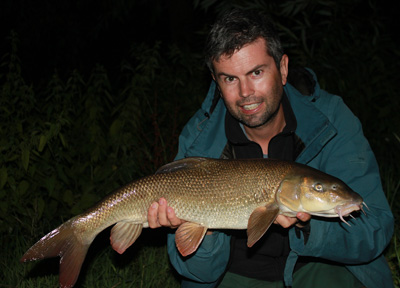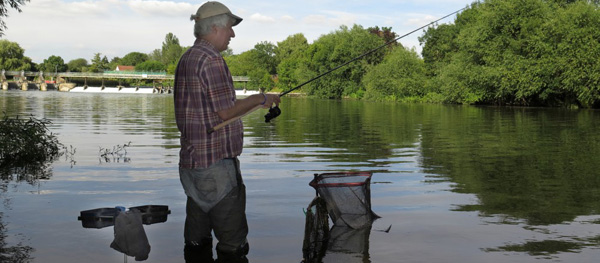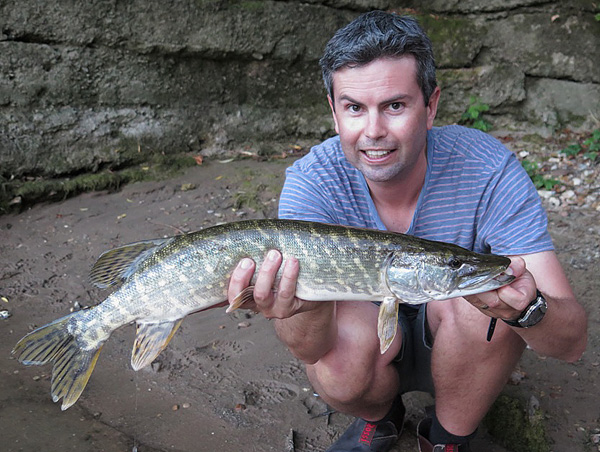We Brits have always liked our foreign fishing trips. Perhaps it is throwback to the days of far flung empire when our officer class would venture out into the bush with their greenheart fly rods and try and emulate the pleasures to be found on a much-missed Scottish salmon river or English chalk stream?
We have these pioneers to thank for the ‘discovery’ of mahseer fishing in India and the presence of trout in Kashmir and New Zealand. It seemed that wherever we went we tried to recreate another England and could it be that some of this rubbed off on the modern angler?
Like most anglers of my generation my early fishing adventures, beyond the comfort of our native shores, were somewhat less exotic. In the 1970s a spring trip to Ireland was as about as exciting as it got, except for those with particularly deep pockets. Budget airlines and designer travel rods had yet to emerge so our sights were set on wherever it was possible to travel by car ferry.
We had a three month close season for all coarse fishing from mid-March to mid-June so the urge to find somewhere to wet a line as the weather improved was often irresistible.
In those days Ireland was a fishing Mecca. 100lb hauls of bream, huge pike, big nets of roach, rudd and hybrids were not just possible, but at time commonplace, for visiting anglers with half an idea and enough bait and local knowledge. Travel companies sprung up offering everything from angler-friendly accommodation and block ferry bookings to bait fridges and weekly maggot deliveries. The Irish Tourist Board rose to the challenge and even installed road signs indicating what species could be caught in what lakes. I don’t use sat navs but I have often wondered where someone would end up if they typed in ‘bream’ whilst driving west from Dublin!
The years have rolled by, the world has got smaller and perspectives inevitably change. I’ve been lucky enough to have fished parts of the planet that I never dreamed I would ever see back in the days when we were smuggling pillow cases full of live maggots aboard Irish Ferries. And along the way I’ve picked up some good fishing mates in Europe, Canada, USA, Australia, New Zealand, Africa and India. Trust me; this is a good thing to have as nothing beats local knowledge and local connections. Exotic fishing locations might look good in travel brochures but no matter how competent we are at our craft no one can catch fish that are not there.
As in any relationship we have to put in what we take out. This means that when my foreign fishing friends land on these shores I feel honour bound to ensure that they don’t leave without a bent rod and a half decent angling experience. This is not always easy when trying to provide a good day out for someone whose staple fishing diet is leaping marlin, angry snapper or reel screaming tuna. And so it was that last month I found myself hosting Aussie fisheries expert and big game angler, Dr Ben Doolan, who was over here on a work trip.
His early impressions of the UK were not going to be the best as he was spending three days at a conference in Hull. However, in return for helping us out on the Angling Trust stand at the Game Fair in the pristine grounds of Oxfordshire’s Blenheim Palace, I agreed to give him a taste of what the local angling scene had to offer the foreign visitor.
Although Ben (or Dools) now lives three hours north of Sydney in the marlin capital of Port Stephens, he began his fishing career in more humble surroundings. He is one of the few Aussie anglers I’ve met who actually enjoy catching carp and perch, so perhaps it would be possible to convince him that English coarse fishing did have more to offer than just an efficient method of collecting livebait for more worthwhile species?
And just to add to the pressure, the next week I’d promised a day out to another Aussie who wouldn’t be fobbed off by a quick session at the local carp puddle. Young Jack Harnwell is the son of my good friend Jim Harnwell who edits Australian Fishing World, the leading angling magazine down under. Jack has inherited his father’s loathing for all things carpy and, I suspect, will only be impressed by the best we have to offer.
So where do we take our foreign guests to show them a good time on the water given the inevitably constraints of time and unpredictable weather?
Most of these guys hardly ever fish with bait these days and wouldn’t know a waggler from a wallaby. With few exceptions lure fishing in the UK is miles behind that practised in the USA and Australia and we simply don’t have the range of white knuckle, surface striking predators that are so sought after in other countries. However, when I do publish a picture of a nice bass from the south coast or Ireland there are usually a few murmurs of approval from the Aussies and the occasional ‘cool looking fish mate’ type comments. So bass were clearly an option but I don’t have ready access to a sea going boat, Ireland is too far away and dawn and dusk sessions from the shore aren’t that easy to arrange when you live in Reading… Besides which bass stocks are in trouble in the UK meaning that success would be by no means guaranteed.
Pike were a possibility too, but they would need to find another guide as I only fish for the things out of necessity when they are attacking my beloved roach.
 An easier option would be barbel. The Aussies have nothing like them; they pull hard and live in rivers with decent flow and good habitat – not something that is exactly commonplace over there. And so it was that a plan was hatched to show Dr Dools what his Mother Country still had to offer in terms of freshwater fishing. He was due to spend some time with my mate Dominic Martyn from the Environment Agency, learning about how we undertake river basin management planning. Dom is a fine barbel angler and kindly agreed to take Ben out for an evening session on our local River Loddon.
An easier option would be barbel. The Aussies have nothing like them; they pull hard and live in rivers with decent flow and good habitat – not something that is exactly commonplace over there. And so it was that a plan was hatched to show Dr Dools what his Mother Country still had to offer in terms of freshwater fishing. He was due to spend some time with my mate Dominic Martyn from the Environment Agency, learning about how we undertake river basin management planning. Dom is a fine barbel angler and kindly agreed to take Ben out for an evening session on our local River Loddon.
Now the Loddon holds some very fine fish but is no easy river. However, at 11.30pm, just when hope was receding, Ben’s rod tip crashed round and a lovely barbel gave a fish starved Aussie a lively battle in the confines of a snaggy small-river swim.
With the job half done the pressure was off so I decided to offer our visitor something completely different. Stick float fishing on two pound line with hemp and tares is about as far removed from hurling heavy poppers at warm water predators as you could possibly get but Ben was up for the challenge.
Despite never having fished with a fourteen foot rod or a closed face reel I was impressed how quickly Ben got the hang of what must have been a totally alien way of fishing. Within an hour that lightly-shotted float was being inched down the flow on the River Thames at Wallingford as if he had been born to it. Some careful feeding saw the fish lined up and before long a steady stream of roach, dace and small chub were coming to the net. These fish weren’t particularly big but Ben understood how even minor adjustments to presentation and to shotting patterns could make a real difference to catch rates.

Later on in our session we were joined by a few chunky roach/bream hybrids with a liking for sweetcorn before a feeding pike gatecrashed the party, scattered the shoal and ruined proceedings. Not one to miss an opportunity our intrepid visitor marched up the hill to the van to collect his spinning gear and promptly began throwing lures around.
It goes without saying that the pesky pike was soon captured, and, much as I admired the skill and adaptability of my guest, it holds true that you can take the angler out of Australia – but you can’t take the Aussie out of the angler!

This article forms part of Martin’s Angling Trust Fighting for Fishing blog and is reproduced in an edited form here on FishingMagic with his kind permission.










